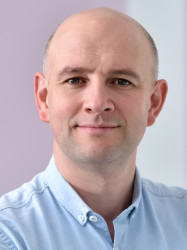Summary
Tom Ellis is leading a research team in synthetic genome engineering and synthetic biology in the Department of Bioengineering. He has track record in synthetic biology, being author of over 60 publications in synthetic biology including work in Science, Cell, Nature Methods, Nature Biotechnology, PNAS and Nature Reviews. He has led the UK-funded project to build a synthetic yeast chromosome for the international synthetic yeast project (Sc2.0) and been a pioneer in the field of Engineered Living Materials. He co-leads the teaching of Imperial’s synthetic biology undergraduate module and has won multiple awards for teaching and for supervision of iGEM teams. His research focuses on developing the foundational tools for design-led synthetic genomics and synthetic biology, focusing on research projects in yeast (S. cerevisiae), and particularly projects to grow new functional biomaterials. His group also do a wide variety of other synthetic biology projects relevant for industry and medicine.
For more information about Tom Ellis and his lab, please visit the Tom Ellis Lab Webpage
Tom’s research publications can be found at Google Scholar
BACKGROUND
Tom Ellis obtained his PhD from the University of Cambridge under the supervision of Michael J. Waring in 2004, examining drugs that bind directly to the promoter elements of cancer genes. Prof Ellis followed-up his PhD research at a the biotech company Spirogen where he set-up a biological screening unit and developed high-throughput assays to characterise the interactions between drugs and oncogene promoters.
Prof Ellis returned to academic research in 2006 to spend two years investigating synthetic biology at Boston University, USA. Working in one of the founding groups of the field under the supervision of Jim Collins, Prof Ellis devised a synthesis-based library approach to engineering gene regulatory networks and was able to model and implement this method in nonlinear systems and with phenotypes relevant to biofuel and beer production.
In 2009 before joining Imperial College, Prof Ellis returned to the UK to research synthetic biology at the Institute of Biotechnology at University of Cambridge.
Research interests
Tom Ellis's main research interests are:
- synthetic genomics
- engineered living materials
- synthetic biology
- genome engineering
- the function of DNA sequence
- programming biosynthesis of new therapeutics
Selected Publications
Journal Articles
Shaw W, Yamauchi H, Mead J, et al., 2019, Engineering a model cell for rational tuning of GPCR signaling, Cell, Vol:177, ISSN:0092-8674, Pages:782-796.e27
Blount B, Gowers G, Ho JCH, et al., 2018, Rapid host strain improvement by in vivo rearrangement of a synthetic yeast chromosome, Nature Communications, Vol:9, ISSN:2041-1723
Ceroni F, Boo A, Furini S, et al., 2018, Burden-driven feedback control of gene expression, Nature Methods, Vol:15, ISSN:1548-7091, Pages:387-393
Awan AR, Blount BA, Bell DJ, et al., 2017, Biosynthesis of the antibiotic nonribosomal peptide penicillin in baker's yeast, Nature Communications, Vol:8, ISSN:2041-1723, Pages:1-8
Gilbert C, Howarth M, Harwood CR, et al., 2017, Extracellular self-assembly of functional and tunable protein conjugates from Bacillus subtilis, Acs Synthetic Biology, Vol:6, ISSN:2161-5063, Pages:957-967
Florea M, Hagemann H, Santosa G, et al., 2016, Engineering control of bacterial cellulose production using a genetic toolkit and a new cellulose-producing strain, Proceedings of the National Academy of Sciences of the United States of America, Vol:113, ISSN:0027-8424, Pages:E3431-E3440
Casini A, Storch M, Baldwin GS, et al., 2015, Bricks and blueprints: methods and standards for DNA assembly, Nature Reviews Molecular Cell Biology, Vol:16, ISSN:1471-0080, Pages:568-576
Ceroni F, Algar R, Stan G-B, et al., 2015, Quantifying cellular capacity identifies gene expression designs with reduced burden, Nature Methods, Vol:12, ISSN:1548-7105, Pages:415-418
Ellis T, Adie T, Baldwin GS, 2011, DNA assembly for synthetic biology: from parts to pathways and beyond, Integrative Biology, Vol:3, ISSN:1757-9694, Pages:109-118
Ellis T, Wang X, Collins JJ, 2009, Diversity-based, model-guided construction of synthetic gene networks with predicted functions, Nature Biotechnology, Vol:27, ISSN:1087-0156, Pages:465-471

